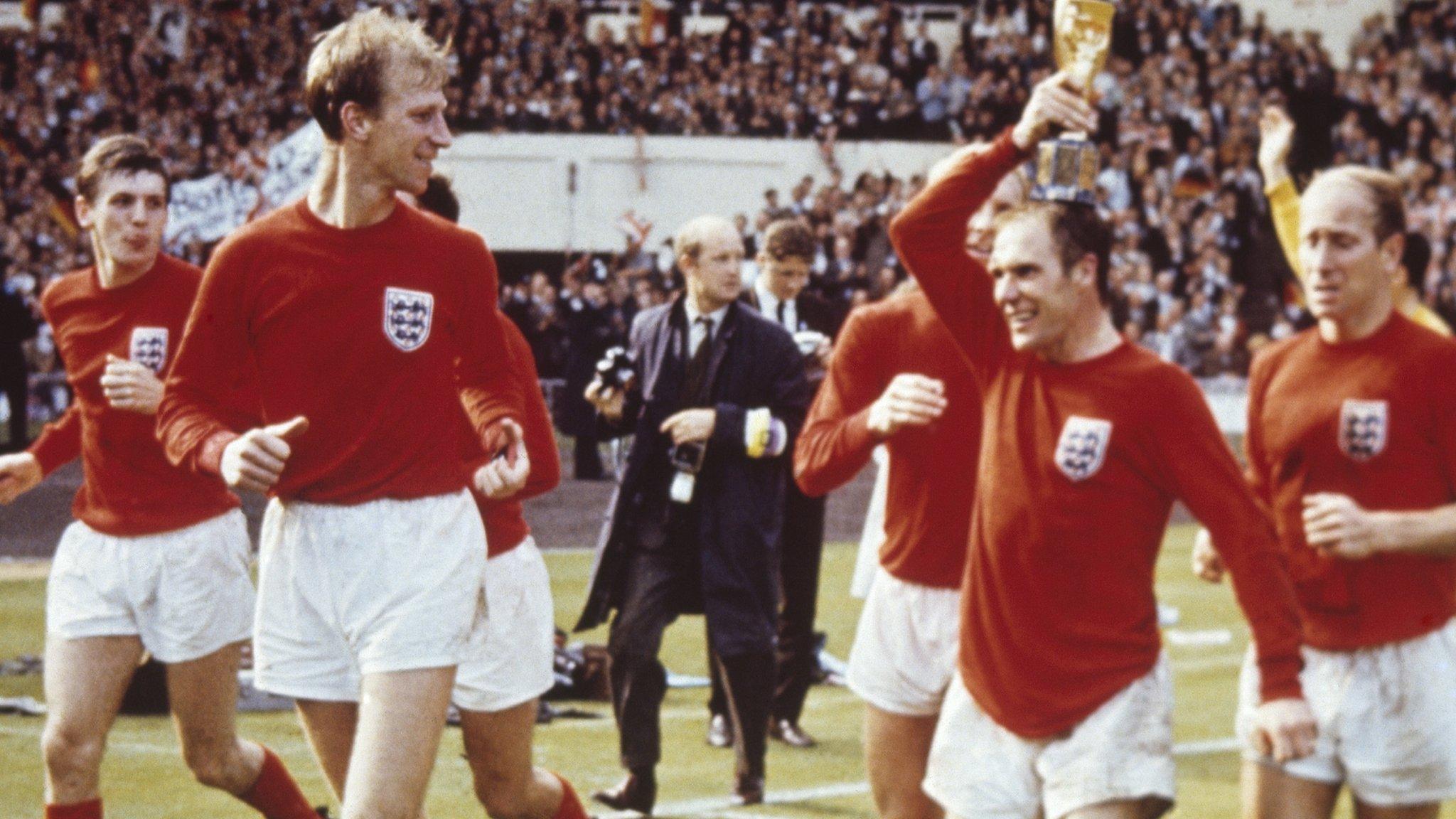Martin Peters obituary - 'a trailblazer for modern midfielders'
- Published
1966 World Cup Final: Martin Peters volleys England in front
Martin Peters, who has died aged 76, will forever be remembered as the England World Cup winner described as "10 years ahead of his time" by his manager Sir Alf Ramsey.
As immaculate off the pitch as he was on it, Peters was the thinking man's midfielder and a trailblazer for the modern goalscoring midfield players who populate the Premier League today.
He scored England's second goal in the 4-2 win over West Germany in the World Cup final - but this is just one part of a career that brought club successes in domestic and European football to set aside his day in the glorious sunshine at Wembley on 30 July 1966.
The pupil from the West Ham academy
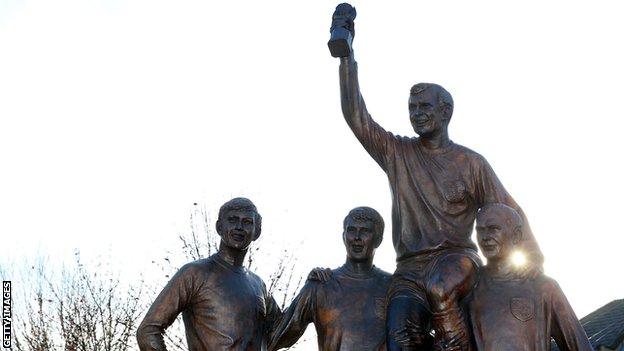
Bobby Moore, Geoff Hurst, Martin Peters and Ray Wilson feature in a statue near West Ham's former Upton Park stadium
Plaistow-born Peters, whose father was a lighterman on the River Thames, was a product of the West Ham United academy, a hothouse of forward thinking led by players such as Malcolm Allison and put into practice by managers Ted Fenton and most notably Ron Greenwood.
Tall, lean and elegant, Peters was the perfect pupil for Greenwood's desire to bring intelligence and tactical awareness to the game, developing alongside those other England World Cup heroes captain Bobby Moore and hat-trick hero Sir Geoff Hurst - and Hammers fans still boast about how West Ham won the World Cup.
He had the natural gifts and awareness that allowed him to act like a sponge for Greenwood's progressive techniques, easily absorbing his manager's instructions and carrying them out with authority.
Peters, like another West Ham legend of later years Sir Trevor Brooking, exerted his influence through speed of thought and natural ability as opposed to physical presence. He became known as 'The Ghost' for his ability to arrive undetected among heavy traffic in the penalty area to score.
He made his debut on Good Friday 1962 in a 4-1 win against Cardiff City and his first goal came in a 6-1 win at Manchester City the following September.
It was the start of a career that would bring him 100 goals in 364 games for West Ham as he settled into a pattern of performance and goalscoring that would define his style.
Greenwood's team was regarded as talented but fragile alongside the fierce competition offered by the likes of Manchester United, Everton, Liverpool, Leeds United and the north London giants Arsenal and Tottenham, but they still enjoyed moments of glory.
Amid that success there was disappointment for Peters, who was not included in the West Ham side that won the FA Cup final against Preston North End in 1964, victory being secured by Ronnie Boyce's last-minute winner.
There was to be consolation, of sorts, for Peters a year later when he was a key component of the team that won the European Cup Winners' Cup against 1860 Munich at Wembley, courtesy of two goals from Alan Sealey.
Peters continued to be one of the most significant members of a West Ham team that was pleasing on the eye, operating with characteristic stealth and intelligence, but short on success - his future glories were to come elsewhere.
England's man ahead of his time
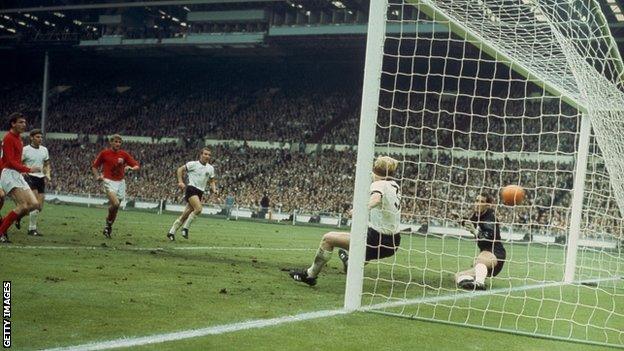
Martin Peters scored England's second goal in the 1966 World Cup final
In the modern parlance, Peters was a "bolter" in Sir Alf Ramsey's plans for the 1966 World Cup - the player who came up on the rails to make his case for inclusion close to the tournament.
It proved to be an inspired choice by Ramsey as Peters helped him fulfil his much-derided prophecy that England would indeed lift the Jules Rimet Trophy on home soil.
Peters only made his England debut on 4 May 1966 in a 2-0 win over Yugoslavia at Wembley, scoring the first of his 20 goals for his country on his second appearance against Finland in Helsinki on 26 June.
He did not actually figure in England's line-up at the start of the 1966 World Cup, missing the opening group game against Uruguay at Wembley. Peters started the second match against Mexico and was then a permanent fixture under Ramsey.
Peters helped Ramsey implement a system known as the "wingless wonders" after Liverpool's Ian Callaghan, Southampton's Terry Paine and Manchester United's John Connelly all played in the group phase but were left out of the knockout games as England's system reaped the ultimate reward.
He once said: "I wasn't a winger. Alan Ball and I were midfield players that broke wide. We had to get back and defend. We worked hard to defend when we played against a midfield player opposite us and then would break to support attacks.
"I wasn't quick but I could run and run and run, so I would run into the box, see a space, run into there. If the ball didn't come in you'd get out again, run in and then would come in and bang - goal."
It was Peters' cross from the left flank that enabled Hurst to head home England's winner in the tempestuous quarter-final against Argentina at Wembley, a game remembered for the sending-off and lengthy departure of the visitors' captain Antonio Rattin and Ramsey tearing George Cohen's shirt away from an opponent as they tried to exchange them at the final whistle.
At the age of 22, Peters was to take his place in England's sporting hall of fame as he scored the sort of goal that became his trademark in the final against West Germany, pouncing in the penalty box to put England 2-1 ahead.
Hurst recalled: "When you look at the film of Martin after his goal in the final you can see him flicking his fingers out. He said the exhilaration was like an electric current running through his hands.
"He was a fantastic player, a natural footballer who was totally and utterly devoted to the game."
It was the high watermark of his England career and future World Cups would provide bitter disappointment for Peters and Ramsey, the manager whose aloof public profile was at odds with the complete devotion he inspired in his players.
Peters, now at Spurs, was still central to Ramsey's plans when an England team many still argue was better than the 1966 World Cup winners in terms of pure talent, headed to Mexico four years later.
The great names remained while Nobby Stiles had been replaced in midfield by Spurs captain Alan Mullery, Everton pair Brian Labone and Keith Newton replaced Jack Charlton and Cohen, while Manchester City's Francis Lee came in for Liverpool's Roger Hunt.
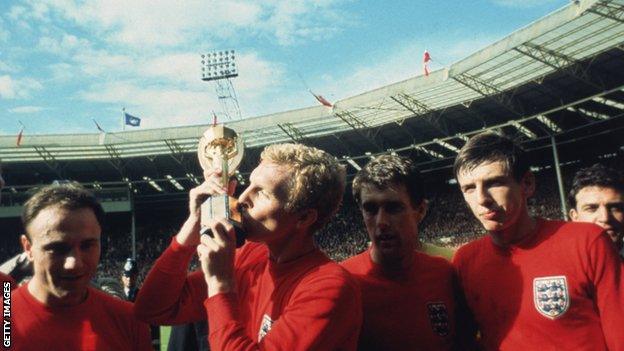
Martin Peters (r) is one of only two Englishmen to ever score in a World Cup final
And when Peters put England 2-0 up in the now infamous quarter-final against West Germany in Leon with one of those familiar far-post arrivals on the end of Newton's right-wing cross, Ramsey looked on course for more success.
Instead, with the outstanding Chelsea goalkeeper Peter Bonetti having a rare off day as a late replacement after Gordon Banks was taken ill and Ramsey's substitution of Bobby Charlton with Colin Bell backfiring, West Germany fought back to win 3-2.
It was the end of that golden England era.
Peters was Ramsey's captain, with Moore replaced by Norman Hunter, on one of the dark nights of England's football history - 17 October 1973 and the final World Cup qualifier against Poland at Wembley that they needed to win to qualify for the 1974 finals in West Germany.
It was a night that belonged to Poland goalkeeper Jan Tomaszewski, labelled "a clown" by Brian Clough, as he performed heroics and his goal led a charmed life as England could only draw 1-1.
It was the end of Ramsey, and Peters followed not long after. He won his final cap on 18 May 1974 in the 2-0 defeat by Scotland at Hampden Park, Joe Mercer having taken over as caretaker manager from Ramsey.
Peters may have had an inauspicious end to a magnificent England career but his record of 67 caps, 20 goals and a World Cup win secures his place in history.
Tottenham and beyond
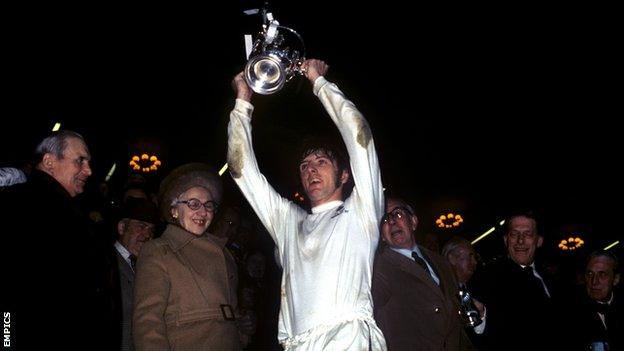
Peters lifts the League Cup for Tottenham in 1973
Peters cut his ties with West Ham in March 1970, becoming Britain's first £200,000 player when he signed for Spurs, although a portion of the fee was taken up with Jimmy Greaves making the reverse journey to Upton Park.
He was at his peak at 26, figuring in a side with a more ruthless edge under manager Bill Nicholson and alongside players of the calibre of Pat Jennings, Mike England, Mullery, Martin Chivers, Steve Perryman and Alan Gilzean.
Peters was able to add his elegant flourishes and natural eye for a goal to these talents and he went on to further success at White Hart Lane.
He scored on his debut in a 2-1 loss against Coventry City and finally won domestic honours when Spurs beat Aston Villa 2-0 in the 1971 League Cup final at Wembley. Peters was captain when Spurs repeated the feat two years later as Norwich City were beaten in the final.
Peters won the Uefa Cup with Spurs in 1972 when Wolverhampton Wanderers were beaten in an all-English final, but tasted defeat in the final two years later when they lost to Feyenoord in a tie that was overshadowed by crowd violence.
He left Spurs for Norwich City in a £50,000 deal in March 1975, having scored 76 goals in 260 appearances for the club.
Even in his latter years, Peters was still able to show the old mastery and enjoyed an Indian summer at Carrow Road, winning the club's player of the year award in 1976 and 1977. In 2002 he was made an inaugural member of Norwich City's Hall Of Fame.
In 1978, while still at Norwich, Peters was made an MBE for services to football. He is still regarded as one of the finest players to represent the Canaries, scoring 44 goals in 206 league appearances before joining Sheffield United as player-coach in July 1980.
Peters was Harry Haslam's designated successor as Sheffield United manager but only had a brief and unhappy spell in charge for 16 games between January and May in the 1980-81 season when the Blades were relegated to the old Fourth Division.
It was his final involvement as a player or manager and he later went on to work in the insurance industry.
Peters made a career total of 880 appearances, scoring 220 goals and was inducted into English football's Hall Of Fame in 2006, confirming his status as one of the towering figures of the post-war football generation.
- Published8 February 2017
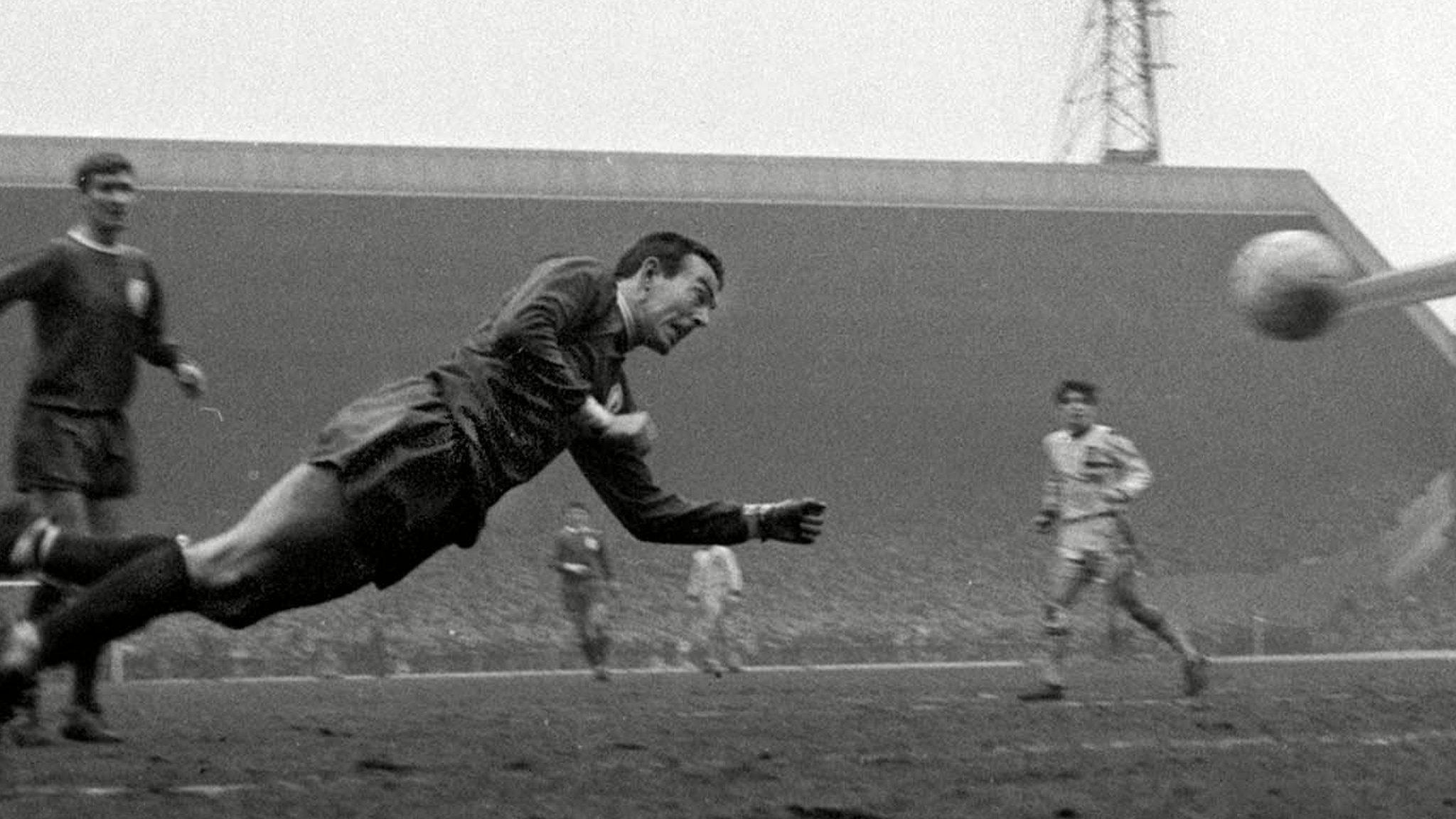
- Published9 April 2016
